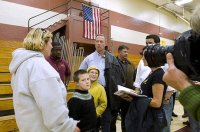Hurricane Sandy: An SEL Lesson in Responding to Calamity
Your content has been saved!
Go to My Saved Content.As many of us cope with the results of Hurricane Sandy, whether awaiting the return of power, finding gasoline, wondering how to get to and from work, worrying about parents and other family members who are stranded, dealing with displacement of a temporary or permanent nature, or some combination of these, it is a time for reflection on the fragility of our modern lives and our genuine interdependence.
Of course, this is not news to those who have suffered through other calamities, with familiar names, like Katrina, Isabel, Andrew, and other unnamed disasters that have been equally debilitating, even if not as widespread or well known.
What I am asking us to reflect on, though, are the everyday calamities suffered by the millions of children in the United States who live in poverty, and especially those who are homeless. How can we expect them to excel? Those of us who have, or are, suffering from calamity must realize that these children suffer a version of these calamities every day. Until and unless we recognize the social and emotional toll this takes on children, their parents, and their teachers, we will never adequately address the inequities and "gaps" in our educational system.
There are no easy solutions to this. The solutions lie ultimately at the policy level and educators have a responsibility to also be advocates. But advocacy does not help children today and tomorrow. For that, I think we need compassion to an even greater extent than ever, when teachers' incomes may be linked to children's achievement and the children do not appear to be motivated or responsive to greater and greater efforts to boost their scores.
Beyond compassion, I think we need to give children the SEL skills they need to cope with the everyday issues they have to face -- emotion regulation and problem solving being at the top of my list. However, having said that, we want to avoid "blaming the victim"; we cannot expect disadvantaged children to cope with all of their adversities and be as successful as their more advantaged peers.
So please extend an extra measure of compassion to your students, and their parents, who are suffering from Hurricane Sandy, directly or indirectly. But also extend that same compassion to those who suffer from the everyday calamities of poverty and disadvantage, and work to ensure that your school provides children with the SEL skills they need to cope with calamity, even while we advocate to minimize the calamities that they have to experience every day.
